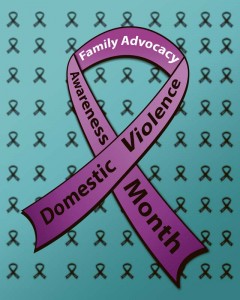Low manning at the office, being in a foreign country or just another late night at work may be normal for some, but add them all together and the stress can become overwhelming.
Handling stress is an important part of life and if not handled correctly, it could harm a loved one. That’s where Family Advocacy can help.
“Domestic abuse occurs worldwide, including military families,” said Carmen Schott, Family Advocacy outreach manager. “But the only way we can provide help is if they come to us. A person can tell their supervisor they have a medical appointment without revealing it’s with Family Advocacy. Even if we have to call back at your office to speak with you, we do not identify ourselves. We just say that it is the clinic calling.”

October is Domestic Violence Awareness Month and the goal is to educate the community on the resources and services Family Advocacy offers.
Going to Family Advocacy before it becomes too much to handle can prevent situations from getting out of control, requiring security forces and leadership to become involved.
“Once security forces responds to a domestic violence incident, that service member’s first sergeant is then notified and the member is mandated to come to us for assessment,” Schott said. “The only time we are required to report something is when a patient actually tells us about an instance of abuse or that they are a danger to themselves or others.”
In order to avoid mandatory intervention, Family Advocacy also provides courses for those who feel they need help at home, such as couple communication counseling, stress management, anger management and much more.
“The best thing to do is to seek help before an abuse occurs,” Schott said. “We offer many prevention programs, and the most important thing to keep in mind is that domestic violence tends to get progressively worse in a relationship if intervention isn’t made.”
Early intervention is not only important for married couples but for unmarried couples as well. Family Advocacy has changed its policy concerning domestic violence referrals to where a person no longer has to be married for it to be considered domestic violence.
“Some of the more frequent cases we see are where the individual won’t allow their partner to leave the home or they were being held against their will during an argument,” said Thea Levine, Family Advocacy victim advocate. “The best thing you can do is to just let your partner leave and take care of the matter once everything has calmed down.”
By requiring at least three years experience helping families, counselors have the background needed to provide aid in any situation even if an attack has already been made.
“We see strong people fall into abusive relations, and what is difficult is they aren’t being abused by a random attacker, it is the person they love,” Levine said. “These survivors have spent a majority of their life and may even have kids with their abuser; this is what makes taking action so hard for them, and this is where we come in. We provide the counseling to help the survivor, assure them that what happened is not their fault and to give them the hope they need to recover.”
To contact Ramstein’s Family Advocacy Program, call 479-2370 or 06371-46-2370. To reach the Army’s Family Advocacy Program, call 493-4331 or 0631-3406-4331.


